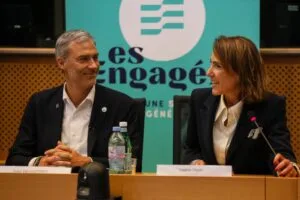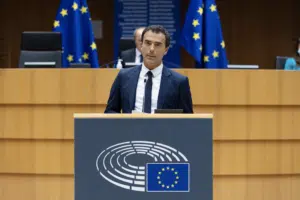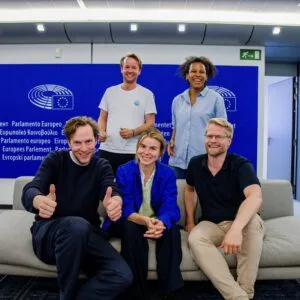Brussels – Having been overtaken, the Renew Europe liberals set to work to make up the three-seat gap with the European Conservatives and Reformists (ECR) group. The first box was filled today (June 20) with the entry of a new Belgian member. However, contacts are still intense with MEPs who are unaffiliated with or have left other groups in the European Parliament to regain control of the third place—by number of seats—in the Strasbourg hemicycle.

The news of the first movement within the ranks of Renew Europe was given by the group’s chairwoman, Valérie Hayer, and the secretary general of the European Democratic Party (and one of the three Spitzenkandidaten of the European Liberals in the June elections), Sandro Gozi, welcoming Belgian MEP Yvan Verougstraete of Les Engagés. This centre-right liberal force has withdrawn its membership from the European People’s Party (EPP) and joined the European political family of the EDP. “Together we become stronger to counter extremism in Europe,” is the welcome reserved by Secretary-General Gozi. Verougstraete himself had announced at the constituent meeting of the EPP group on Tuesday afternoon (June 18) that he was leaving to join the Renew Europe group. At today’s press conference with European liberal leaders, he clarified that he wanted to “represent the humanist and more progressive wing of the party.” Group chair Hayer also says to be “immensely proud to welcome a new political party to our pro-European ranks.”

With the group now numbering 81 members (there were 80 after the outcome of the European elections), Renew Europe aims to counter-takeover the 83 of conservative right-wing ECR (which has seen an increase of 10 new members in the last week and a half). “I think this is the first of a series of arrivals,” Gozi assured, speaking to the press and anticipating that “in the coming weeks, we will have proof that the centrist positions of reasonableness and pragmatism of the EDP will be extremely attractive.” Net of contacts with those elected in parties that were not representatives in the European Parliament in the last legislature—and must therefore seek affiliation in one of the parliamentary groups—the road seems somewhat uphill after the first rumours about the intentions of the five MEPs elected from the ranks of Volt Europa. The pan-European party is a member of the Green/Ale group, but since June 10, it has been in talks with Renew Europe about a possible transfer of the Dutch Anna Strolenberg and Reinier van Lanschot, and the Germans Damian Boeselager, Nela Riehl and Kai Tegethoff.

According to the Dutch daily De Telegraaf, Volt Europa MEPs would be skeptical about joining a group whose ranks also include the controversial liberal-conservative Czech populist party Ano 2011 (Action of Dissatisfied Citizens) and the Dutch People’s Party for Freedom and Democracy (VVD), which gave the green light to a government with the far-right anti-immigration, anti-Islamic and strongly euroskeptic PVV (Party for Freedom). “One of the reasons for our existence is the fight against national populism,” said Volt Europa co-chair van Lanschot: “It is therefore undesirable for us to participate in a group in which Ano is a member and in which not enough measures are taken against parties like the VVD that work with populists like PVV.” The membership’s decision on the elected members’ proposal will be announced next Monday (June 24). Still, the European liberals’ weapons to convince them are quite blunt, partly because Renew Europe cannot afford a haemorrhage of 11 exits in the face of only five admissions (it would drop to 75).
Sources inside the group say that, at the moment, “there are no internal discussions” about the seven Czechs of Ano 2011 (member of the European Alde family), whose leader, ex-premier Andrej Babiš—well known in Brussels especially for his conflicts of interest when he was prime minister of the Czech Republic between 2017 and 2021—before the European elections had ventilated the possibility of leaving the Renew Europe group. As for the Dutch VVD, on the other hand, “there has been an internal discussion,” the same sources say, and the Alde party has reportedly decided to send “an observation mission” to the Netherlands “to follow up on the case.” Even though in early May, the leaders of Renew Europe, the Progressive Alliance of Socialists and Democrats (S&D), the Greens/Ale and the Left had signed a joint statement in which they pledged not to enter into coalitions with the far right “at any level”, it is difficult to think of an expulsion of the four Dutch members. The same kind of alliance has been holding up the Finnish government for almost a year, with the Swedish People’s Party of Finland (Alde member) as the minority partner of the conservative National Coalition Party and the far-right True Finns, while since October 2022 the Swedish government composed of Swedish Liberals (Alde member), Moderates, and Christian Democrats (both of the EPP) has decisive outside support from the far-right Swedish Democrats.
English version by the Translation Service of Withub









